仁爱英语七年级上册Unit3-4知识点整合
仁爱英语七年级上unit3知识点
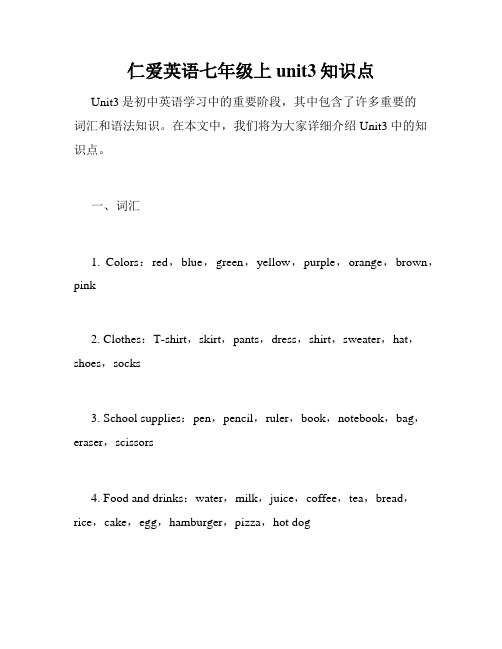
仁爱英语七年级上unit3知识点Unit3是初中英语学习中的重要阶段,其中包含了许多重要的词汇和语法知识。
在本文中,我们将为大家详细介绍Unit3中的知识点。
一、词汇1. Colors:red,blue,green,yellow,purple,orange,brown,pink2. Clothes:T-shirt,skirt,pants,dress,shirt,sweater,hat,shoes,socks3. School supplies:pen,pencil,ruler,book,notebook,bag,eraser,scissors4. Food and drinks:water,milk,juice,coffee,tea,bread,rice,cake,egg,hamburger,pizza,hot dog5. Family members:father,mother,sister,brother,grandfather,grandmother,uncle,aunt,cousin6. Numbers:one,two,three,four,five,six,seven,eight,nine,ten,eleven,twelve,thirteen,fourteen,fifteen,sixteen,seventeen,eighteen,nineteen,twenty二、语法1. 介词介词是英语中非常重要的语法部分,Unit3中包含了多个常用的介词,如in,on,at,with,to等。
这些介词的正确使用能够帮助我们更加准确地表达自己的意思。
例如:She is sitting on the chair.He is going to the store.The book is in the bag.2. 形容词和副词形容词和副词也是英语语法中的重要部分。
在Unit3中我们学会了很多形容词和副词,如big,small,happy,sad,fast,slow 等等。
仁爱版七年级英语 (上) 教材梳理篇 Unit3~4
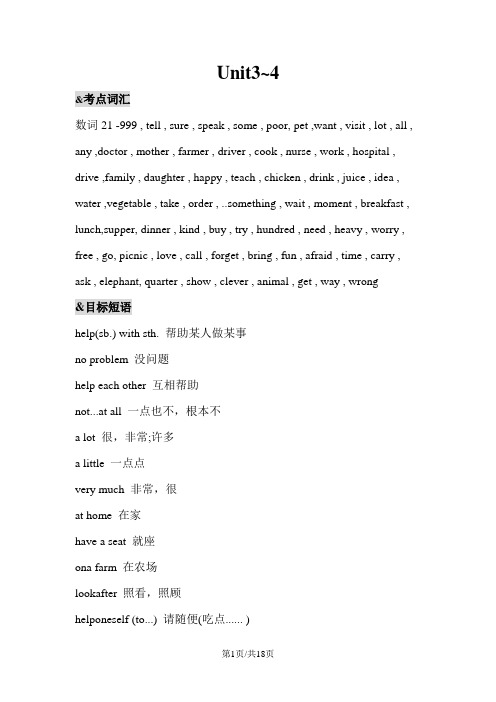
Unit3~4&考点词汇数词21 -999 , tell , sure , speak , some , poor, pet ,want , visit , lot , all , any ,doctor , mother , farmer , driver , cook , nurse , work , hospital , drive ,family , daughter , happy , teach , chicken , drink , juice , idea , water ,vegetable , take , order , ..something , wait , moment , breakfast , lunch,supper, dinner , kind , buy , try , hundred , need , heavy , worry , free , go, picnic , love , call , forget , bring , fun , afraid , time , carry , ask , elephant, quarter , show , clever , animal , get , way , wrong&目标短语help(sb.) with sth. 帮助某人做某事no problem 没问题help each other 互相帮助not...at all 一点也不,根本不a lot 很,非常;许多a little 一点点very much 非常,很at home 在家have a seat 就座ona farm 在农场lookafter 照看,照顾helponeself (to...) 请随便(吃点...... )allright 行了,好吧;不客气a glass of 一杯good idea 好主意wait a moment 等一等,等一会儿something to drink 喝的东西takeone's order 记下顾客点的菜eat out 下馆子,出去吃饭have dinner 吃饭such as例如here you are 给你bekind to sb. 对某人友好beglad to do sth. 喜欢做某事overthere 在那边tryon 试穿thinkof 认为,想起thinkabout 考虑dosome shopping 购物,买东西buysth. for sb. 给某人买某物befree 有空gofor a picnic 野餐tellsomebody about something 把某事告诉某人gofishing/ shopping 去钓鱼/购物haveto 不得不speakto... 和……说话,向……说callsb. back 给某人回电话havea picnic 野餐nexttime 下次getup 起床gohome 回家havebreakfast/ lunch/ supper 吃早饭/午饭/晚饭onone's way home 在某人回家的路上&重点句型1. —Excuseme , could you please tell me your name?—Sure , my nameis Jane.2. —Could you helpme with Chinese?— No problem.3. —Who is the letter from?一It's from my pen pal , Sam.4. —Whatdoes he say in the letter?—He wants to visit the Great Wall.5. —Doyou like English?— Yes , I likeit very much/ a lot/ a little.—No, I don'tlike it at all.6. Doyou have any pets?7. —Whatdoes your mother do?—She is ateacher.8. —Where do theywork?—They work on afarm.9. —Wouldyou like some eggs , Maria?—No , thanks.I'd like some chicken.10. —Why not havesome fish and eggs?—Good idea!11. —What do you usually have for breakfast , Michael?一I usually have milk and bread for breakfast.12. —MayI take your order , sir?—Rice and chicken , please.13.Help yourself to some fish.14. —What can I do for you , madam?一I want to buy some clothes for my daughter. 15. —CanI try it on?—Sure.16. —Howdo you like the pants?一They're too long.17. —What do you think of this green skirt?—Oh, I don'tlike it at al1.18. —Couldyou help me do some shopping, Ben?一Sure. What do we need?19. —Are you freethis Sunday?—Yes. What's up?20. 一Don't forget tobring your guitar.—All right.21. —May I speak to Maria?—Oh , sorry. She isn't in now;22. —Couldyou ask her to call me back this evening?—Sure.23. —Do you have timetomorrow?—Yes.24. —Let'smeet at 9 o'clock at my home.—OK.25.What's wrong with you?26.It's time to go home.27.It's very kind of you.&功能意念1.邀请Wouldyou like to cook with us?Youmust come to dinner with us.May Iinvite you to dinner?Steve, what/ how about flying a kite with me?OK.Thank you. /I'd like that, thanks. / All right. /Good idea.Yes ,I'd love to.Thatwould be very nice. /No , thank you.I'dlove to , but I'm afraid 1 have no time.I'msorry I can't. /What about another time?2.职业Whatdo you do ? /What does he/ she do ?Whatare you ? /What is he/ she ?What'syour/his/her job?Whatare you going to be?I'ma(n) teacher/ doctor/ worker/ fanner/businessman/manager/office worker.I'mgoing to be a scientist/ computer engineer.3.时刻Excuseme. What's the time , please?Excuseme. What time is it?Whendid you come to China ? 、Whattime do you get up on weekdays ?It's sixo'clock /half past one/ twenty to two/ a quarter past seven. Icame to China in 2019.I getup at 6:40 in the morning.4.提供帮助Doyou want me to clean the room ?Can Ihelp you ?Whatcan I do for you ?Wouldyou like me to help you ?Letme help you.Yes,please/thanks. /Thank you. /That would be nice/fine. /Thank you for your(the)help.No ,thanks/thank you.Thankyou all the same.That'svery kind of you , but I can manage it myself.&语法精粹1. 掌握人称代词的主格和宾格的用法。
仁爱版七年级上册英语笔记Unit3Topic3-Unit4Topic1知识点总结

仁爱版七年级上册英语笔记Unit3Topic3-Unit4Topic1知识点总结U 3 T3—U4 T11.1)would like = wantwould like没有人称和数的变化I would like an egg.=I want an egg.He would like an egg.= He wants an egg.(would like不能加s)2)would like to do = want to doa. He would like to drink some water.(drink)=He wants to drink some water.b. She would like (visit) the Great Wall.=She the Great Wall.3)I would like=I’d like He would like=He’d like4)a. I’d like an egg.(一般疑问句) Would you like an egg?Yes,please./ No,thanks.b. He’d like a hamburger.he a hamburger?. / .5)Would you like some chicken?(用some 加强语气,表示强调)6)I’d like an egg.What would you like?He’d like some fish.he ?2.1)you—yourself(反身代词)2)yoursel f---yoursel ves(pl.)3.help yourself/yourselves to +n.:随便吃……a. Help yourself (you) to some chicken, Tom.b. Help yourselves (you) to some chicken, kids.4.1)可数名词[C]:有单数和复数的形式.2)不可数名词[UC]:一般没有复数的形式.3)常见的不可数名词有:milk,rice,fish(鱼肉),chicken(鸡肉),(apple/orange) juice,water,bread5.fish:1)作为“鱼” , 是可数名词.fish—fish(pl.)2)作为“鱼肉”, 是不可数名词.some fish6.chicken:1)作为“鸡” , 是可数名词.a chicken2)作为“鸡肉”, 是不可数名词.some chicken7.some + n.(pl.),some+ [UC]some eggssome fish/chicken/milk/apple juice/rice8.---Help yourselves.---Thank you.9.---Would you like…? ---Yes, please. /No, thanks.10.What/How about +sb(宾格)/sth?What about him/her/some milk?11.All right.行,好吧(表示对别人的建议表示赞同)---I’d like some rice and chicken.---All right./doc/6e6981861.html,k for me.13.Me,too.14.表示建议:---What about …? ---Good idea.15.an ideaa good ideaHomework:1.I’d like a hamburger.(一般疑问句) a hamburger?(肯否回答) ./ .2.She’d like some orange juice.she ?3. , boys and girls.(随便吃些鸡肉吧)4.She likes it very much.(否)She it .5..(我想喝些牛奶).6.他们怎么样?Unit 3 T 3 Section B—D1.1)usually:70-80%,often:50-60%2)usually,often放在be之后,行为动词之前.I usually have breakfast at home.2.have…for breakfast/lunch/supper/dinner1)He usually has an egg and some milk for breakfast.2)We usually have some rice and chicken for supper.3.一日三餐前不加a/an/the,后不加s.What do you usually have for/ breakfast?4.1)He usually has some bread for lunch.What does he usually have for lunch?2)We usually have some juice and fish for dinner. usuallyfor dinner?5.have:1)有2)吃,喝:have milk/bread6.[UC]前面不加a/an/the,后不加s.He has / milk and/ bread for breakfast.7.What/How about +sb(宾格)/sth?8.with带着/有,(表示伴随关系)have chicken/fish with vegetables9.some rice10.three meals(餐):breakfast,lunch,supper/dinner11.food:[UC],食物的总称,作主语,谓语用单数.My favorite food is (be) chicken and fish.12.Chinese /English food13.wait(v.)—waiter(指人)(男服务员)---waitress(女服务员)14.take one’s orderMay I take your order?15.something to drink/eat1)修饰词如不定式(to do) ,形容词修饰something时,放在something之后.2)something:某事(肯定句)anything:任何事(否/疑问)nothing:没有什么事(表否定意思的陈述句)3)Would you like +something?Would you likesomething to eat ?16.[UC]表示数量的表达法:1)a glass of apple juice/watera bag of rice /milk2)a glass of apple juice---two/some glasses of apple juice3) a bag of milk---five bags of milk17.wait/just a moment18.Let me see.让我想一想.I see. 我明白了.19.1)Would you like some vegetables?2)some vegetables/rice20.something to drink21.banana juice----Section C1.eat out2.eat---eating(现在分词)3.would like to doWould you like to have (have) dinner with me?4.have / breakfast/lunch/supper/dinner5.with sb(宾格)6.Would you like to have lunch with him?7.Yes, I’d like/love to.(to不能省略)8.1)May/can I help you?=What can I do for you?2)情态动词may/can/could+动原May I help (help) you?9.sir—madam(对应词)10.What would you liketo eat (eat)?11.Why not+动原? =Why don’t you +动原?Why not study (study) with me? = Why don’t you study with me?12.表示建议:1)What about…? 2)Why not…?肯定回答:Good idea.13.Here you are.14.---Would you like sth to drink?---Yes,please./No,thanks.Section D1.in+地点: in China2.many+n(pl.)many friends3.1)all,bothall指三者或三者以上“都”both指两者“都”2)all,both放在be之后,行为动词之前They are all students.We all like school.4.be kind to sbThe teacher is kind to us.5.have dinner with them6.such as +若干例子7.Sichuan food8.be glad to do sthObama is glad to visit (visit) the Great Wall.9.1)here,there是介词,前不加介词.2)be here/thereI’m glad to be (be) here.10.let sb do sthLet me (I) see (see).Homework:1.他晚饭通常吃什么?he usually2.你可以点菜了吗?3.Tom,为什么不随便吃些汉堡包呢,?,Tom?4.你想喝些什么东西吗?来两杯香蕉汁. Would you like.5.She’s glad (be) there.6.I’d like (work) with you.7.Would you like something (say)?8.Why not (tell) him about it.= him about it.9.他对我很友善.He .10.I usually have some rice for lunch. usually for lunch?1.---Do you like…?---Yes, I like …very much/a lot/a little. (No, I don’t like …at all.)Section D1.at / homeHe has a dog at home.2.it’s, its(它是)(它的)a cat. name’s Mimi.3.Tommy =T om4.Zhou Lan likes it a lot.= Zhou Lan likes it very much. (否)Zhou Lan doesn’t li ke it at all.5.some,anyShe has some pets.(否)She doesn’t have any pets.(疑问)Does she have any pets?6.1)人称代词:主格---宾格I—me,you-you,he-him,she-her,it-itwe-us,they-them2)形物代—名物代my-mine,your-yours,his-his,her-hers,its-its,our-ours,their-theirsThis is a girl. name is Lily. is twelve. We like .(Her,She,her) Unit 4 T1 Section A1.What can I do for you?=Can/May I help you?2.madam---sir(对应词)3.want to do = would like to do1)She wants to have milk and bread.=She would like to have milk and bread.2)Would you like a glass of apple juice?=Do you want a glass of apple juice?3)Would she like some vegetables?=Does she want any vegetables?4.clothes:衣服的总称,复数名词,作主语时,谓语用复数形式。
Unit 3Topic 3 知识梳理 仁爱版英语七年级上册

Unit 3 Topic 3 知识梳理一.重点单词yourself(pron.)——yourselves(pl.) △usually(adv.)——usual(adj.)would(modal v.过去式)——will(原形) △kind(adj.)——kindness(n.)二.词组Section A1.help yourself 请你随便吃2.help yourselves 请你们随便吃3.would like sth=’d like sth 想要某物4.would like to do 想要做某事5.would like to eat/drink/have 想要吃/喝/吃(喝)6.some fish/chicken/rice/bread/water/milk/juice 一些鱼肉/鸡肉/米饭/面包/水/牛奶/果汁7.some vegetables/hamburgers 一些蔬菜/几块汉堡包8.all right=OK 好吧Section B1.have...for breakfast/lunch/dinner 早饭吃.../午饭吃.../晚饭吃...2.chicken with vegetables 带蔬菜的鸡肉3.Chinese food 中国菜4.take your order 记下你点的菜5.something to drink/eat 一些喝的/吃的东西6. a glass of apple juice 一杯苹果汁Section C1.eat out 出去吃饭2.have breakfast/lunch/dinner with me 和我吃早饭/午饭/晚饭3.what about=how about 怎么样4.why not +动词原形为什么不Section D1.be kind to sb. 对某人友好三.知识点解析Section A1. Help yourselves!随便吃/请自便!在口语中,help oneself 意为“自取,自用”。
仁爱版七年级上册英语笔记 Unit3 Topic3-Unit4 Topic1知识点

U 3 T3—U4 T11.1)would like = wantwould like没有人称和数的变化I would like an egg.=I want an egg.He would like an egg.= He wants an egg.(would like不能加s)2)would like to do = want to doa. He would like to drink some water.(drink)=He wants to drink some water.b. She would like (visit) the Great Wall.=She the Great Wall.3)I would like=I’d like He would like=He’d like4)a. I’d like an egg.(一般疑问句) Would you like an egg?Yes,please./ No,thanks.b. He’d like a hamburger.he a hamburger?. / .5)Would you like some chicken?(用some 加强语气,表示强调)6)I’d like an egg.What would you like?He’d like some fish.he ?2.1)you—yourself(反身代词)2)yoursel f---yoursel ves(pl.)3.help yourself/yourselves to +n.:随便吃……a. Help yourself (you) to some chicken, Tom.b. Help yourselves (you) to some chicken, kids.4.1)可数名词[C]:有单数和复数的形式.2)不可数名词[UC]:一般没有复数的形式.3)常见的不可数名词有:milk,rice,fish(鱼肉),chicken(鸡肉),(apple/orange) juice,water,bread5.fish:1)作为“鱼” , 是可数名词.fish—fish(pl.)2)作为“鱼肉”, 是不可数名词.some fish6.chicken:1)作为“鸡” , 是可数名词.a chicken2)作为“鸡肉”, 是不可数名词.some chicken7.some + n.(pl.),some+ [UC]some eggssome fish/chicken/milk/apple juice/rice8.---Help yourselves.---Thank you.9.---Would you like…? ---Yes, please. /No, thanks.10.What/How about +sb(宾格)/sth?What about him/her/some milk?11.All right.行,好吧(表示对别人的建议表示赞同)---I’d like some rice and chicken.---All right.k for me.13.Me,too.14.表示建议:---What about …? ---Good idea.15.an ideaa good ideaHomework:1.I’d like a hamburger.(一般疑问句) a hamburger?(肯否回答) ./ .2.She’d like some orange juice.she ?3. ,boys and girls.(随便吃些鸡肉吧)4.She likes it very much.(否)She it . 5..(我想喝些牛奶).6.他们怎么样??Unit 3 T 3 Section B—D1.1)usually:70-80%,often:50-60%2)usually,often放在be之后,行为动词之前.I usually have breakfast at home.2.have…for breakfast/lunch/supper/dinner1)He usually has an egg and some milk for breakfast.2)We usually have some rice and chicken for supper.3.一日三餐前不加a/an/the,后不加s.What do you usually have for/ breakfast?4.1)He usually has some bread for lunch.What does he usually have for lunch?2)We usually have some juice and fish for dinner.usuallyfor dinner?5.have:1)有2)吃,喝:have milk/bread6.[UC]前面不加a/an/the,后不加s.He has / milk and/ bread for breakfast.7.What/How about +sb(宾格)/sth?8.with带着/有,(表示伴随关系)have chicken/fish with vegetables9.some rice10.three meals(餐):breakfast,lunch,supper/dinner11.food:[UC],食物的总称,作主语,谓语用单数.My favorite food is (be) chicken and fish.12.Chinese /English food13.wait(v.)—waiter(指人)(男服务员)---waitress(女服务员)14.take one’s orderMay I take your order?15.something to drink/eat1)修饰词如不定式(to do) ,形容词修饰something时,放在something之后.2)something:某事(肯定句)anything:任何事(否/疑问)nothing:没有什么事(表否定意思的陈述句)3)Would you like +something?Would you likesomething to eat ?16.[UC]表示数量的表达法:1)a glass of apple juice/watera bag of rice /milk2)a glass of apple juice---two/some glasses of apple juice3) a bag of milk---five bags of milk17.wait/just a moment18.Let me see.让我想一想.I see. 我明白了.19.1)Would you like some vegetables?2)some vegetables/rice20.something to drink21.banana juice----Section C1.eat out2.eat---eating(现在分词)3.would like to doWould you like to have (have) dinner with me?4.have / breakfast/lunch/supper/dinner5.with sb(宾格)6.Would you like to have lunch with him?7.Yes, I’d like/love to.(to不能省略)8.1)May/can I help you?=What can I do for you?2)情态动词may/can/could+动原May I help (help) you?9.sir—madam(对应词)10.What would you liketo eat (eat)?11.Why not+动原? =Why don’t you +动原?Why not study (study) with me? = Why don’t you study with me?12.表示建议:1)What about…? 2)Why not…?肯定回答:Good idea.13.Here you are.14.---Would you like sth to drink?---Yes,please./No,thanks.Section D1.in+地点: in China2.many+n(pl.)many friends3.1)all,bothall指三者或三者以上“都”both指两者“都”2)all,both放在be之后,行为动词之前They are all students.We all like school.4.be kind to sbThe teacher is kind to us.5.have dinner with them6.such as +若干例子7.Sichuan food8.be glad to do sthObama is glad to visit (visit) the Great Wall.9.1)here,there是介词,前不加介词.2)be here/thereI’m glad to be (be) here.10.let sb do sthLet me (I) see (see).Homework:1.他晚饭通常吃什么?he usually?2.你可以点菜了吗??3.Tom,为什么不随便吃些汉堡包呢,?,Tom?4.你想喝些什么东西吗?来两杯香蕉汁.Would you like?.5.She’s glad (be) there.6.I’d like (work) with you.7.Would you like something(say)?8.Why not (tell) him about it.= him about it.9.他对我很友善.He .10.I usually have some rice for lunch.usually for lunch?1.---Do you like…?---Yes, I like …very much/a lot/a little.(No, I don’t like …at all.)Section D1.at / homeHe has a dog at home.2.it’s, its(它是)(它的)a cat. name’s Mimi.3.Tommy =Tom4.Zhou Lan likes it a lot.= Zhou Lan likes it very much.(否)Zhou Lan doesn’t like it at all.5.some,anyShe has some pets.(否)She doesn’t have any pets.(疑问)Does she have any pets?6.1)人称代词:主格---宾格I—me,you-you,he-him,she-her,it-itwe-us,they-them2)形物代—名物代my-mine,your-yours,his-his,her-hers,its-its,our-ours,their-theirsThis is a girl. name is Lily. is twelve. We like .(Her,She,her)Unit 4 T1 Section A1.What can I do for you?=Can/May I help you?2.madam---sir(对应词)3.want to do = would like to do1)She wants to have milk and bread.=She would like to have milk and bread.2)Would you like a glass of apple juice?=Do you want a glass of apple juice?3)Would she like some vegetables?=Does she want any vegetables?4.clothes:衣服的总称,复数名词,作主语时,谓语用复数形式。
Unit4+Topic3+精讲精练 仁爱版英语七年级上册

教师姓名学生姓名上课内容七年级上册Unit4 Topic3 学科英语年级七年级上课时间Unit 4 Topic 3课堂教学知识点一、语法时间的表达方式(顺读法,逆读法,时间介词at,问时间的句型)1.表达方式1)顺读:___________;例如:6点20分six twenty;7点30分seven thirty2)逆读:分≤30分,___________________;例如:7点15分a quarter past seven;七点半half past seven 分>30分,___________________;例如:9点45分a quarter to ten2.介词________+时间点(要与回答时间的句型区别开)3.问时间:________________________? = _________________________? (回答要注意没有介词at)二、灵活运用1. ___________________ 在去某地的路上___________________ 在某人回家的路上(※相同用法的还有:here和there)例:在我回家的路上,我遇到我的英语老师。
______________________________________2._____________________ = ___________________该做……的时候了;到做某事的时间了例:到去动物园的时间了。
______________________________________________________3. ___________________ = ___________________ 谢谢某人(做)某事例:谢谢你的帮助。
_______________________ = ________________________4._______ _______ two o’clock ________ the afternoon 在下午大约两点钟例:我和我的朋友在下午两点钟左右去购物。
仁爱版七年级上册英语笔记 Unit3 Topic3-Unit4 Topic1知识点总结

U 3 T3—U4 T11.1)would like = wantwould like没有人称和数的变化I would like an egg.=I want an egg.He would like an egg.= He wants an egg.(would like不能加s)2)would like to do = want to doa. He would like to drink some water.(drink)=He wants to drink some water.b. She would like (visit) the Great Wall.=She the Great Wall.3)I would like=I’d like He would like=He’d like4)a. I’d like an egg.(一般疑问句) Would you like an egg?Yes,please./ No,thanks.b. He’d like a hamburger.he a hamburger?. / .5)Would you like some chicken?(用some 加强语气,表示强调)6)I’d like an egg.What would you like?He’d like some fish.he ?2.1)you—yourself(反身代词)2)yoursel f---yoursel ves(pl.)3.help yourself/yourselves to +n.:随便吃……a. Help yourself (you) to some chicken, Tom.b. Help yourselves (you) to some chicken, kids.4.1)可数名词[C]:有单数和复数的形式.2)不可数名词[UC]:一般没有复数的形式.3)常见的不可数名词有:milk,rice,fish(鱼肉),chicken(鸡肉),(apple/orange) juice,water,bread5.fish:1)作为“鱼” , 是可数名词.fish—fish(pl.)2)作为“鱼肉”, 是不可数名词.some fish6.chicken:1)作为“鸡” , 是可数名词.a chicken2)作为“鸡肉”, 是不可数名词.some chicken7.some + n.(pl.),some+ [UC]some eggssome fish/chicken/milk/apple juice/rice8.---Help yourselves.---Thank you.9.---Would you like…? ---Yes, please. /No, thanks.10.What/How about +sb(宾格)/sth?What about him/her/some milk?11.All right.行,好吧(表示对别人的建议表示赞同)---I’d like some rice and chicken.---All right.k for me.13.Me,too.14.表示建议:---What about …? ---Good idea.15.an ideaa good ideaHomework:1.I’d like a hamburger.(一般疑问句) a hamburger?(肯否回答) ./ .2.She’d like some orange juice.she ?3. , boys and girls.(随便吃些鸡肉吧)4.She likes it very much.(否)She it .5..(我想喝些牛奶).6.他们怎么样??Unit 3 T 3 Section B—D1.1)usually:70-80%,often:50-60%2)usually,often放在be之后,行为动词之前.I usually have breakfast at home.2.have…for breakfast/lunch/supper/dinner1)He usually has an egg and some milk for breakfast.2)We usually have some rice and chicken for supper.3.一日三餐前不加a/an/the,后不加s.What do you usually have for/ breakfast?4.1)He usually has some bread for lunch.What does he usually have for lunch?2)We usually have some juice and fish for dinner.usuallyfor dinner?5.have:1)有2)吃,喝:have milk/bread6.[UC]前面不加a/an/the,后不加s.He has / milk and/ bread for breakfast.7.What/How about +sb(宾格)/sth?8.with带着/有,(表示伴随关系)have chicken/fish with vegetables9.some rice10.three meals(餐):breakfast,lunch,supper/dinner11.food:[UC],食物的总称,作主语,谓语用单数.My favorite food is (be) chicken and fish.12.Chinese /English food13.wait(v.)—waiter(指人)(男服务员)---waitress(女服务员)14.take one’s orderMay I take your order?15.something to drink/eat1)修饰词如不定式(to do) ,形容词修饰something时,放在something之后.2)something:某事(肯定句)anything:任何事(否/疑问)nothing:没有什么事(表否定意思的陈述句)3)Would you like +something?Would you likesomething to eat ?16.[UC]表示数量的表达法:1)a glass of apple juice/watera bag of rice /milk2)a glass of apple juice---two/some glasses of apple juice3) a bag of milk---five bags of milk17.wait/just a moment18.Let me see.让我想一想.I see. 我明白了.19.1)Would you like some vegetables?2)some vegetables/rice20.something to drink21.banana juice----Section C1.eat out2.eat---eating(现在分词)3.would like to doWould you like to have (have) dinner with me?4.have / breakfast/lunch/supper/dinner5.with sb(宾格)6.Would you like to have lunch with him?7.Yes, I’d like/love to.(to不能省略)8.1)May/can I help you?=What can I do for you?2)情态动词may/can/could+动原May I help (help) you?9.sir—madam(对应词)10.What would you liketo eat (eat)?11.Why not+动原? =Why don’t you +动原?Why not study (study) with me? = Why don’t you study with me?12.表示建议:1)What about…? 2)Why not…?肯定回答:Good idea.13.Here you are.14.---Would you like sth to drink?---Yes,please./No,thanks.Section D1.in+地点: in China2.many+n(pl.)many friends3.1)all,bothall指三者或三者以上“都”both指两者“都”2)all,both放在be之后,行为动词之前They are all students.We all like school.4.be kind to sbThe teacher is kind to us.5.have dinner with them6.such as +若干例子7.Sichuan food8.be glad to do sthObama is glad to visit (visit) the Great Wall.9.1)here,there是介词,前不加介词.2)be here/thereI’m glad to be (be) here.10.let sb do sthLet me (I) see (see).Homework:1.他晚饭通常吃什么?he usually?2.你可以点菜了吗??3.Tom,为什么不随便吃些汉堡包呢,?,Tom?4.你想喝些什么东西吗?来两杯香蕉汁.Would you like?.5.She’s glad (be) there.6.I’d like (work) with you.7.Would you like something(say)?8.Why not (tell) him about it.= him about it.9.他对我很友善.He .10.I usually have some rice for lunch.usually for lunch?1.---Do you like…?---Yes, I like …very much/a lot/a little.(No, I don’t like …at all.)Section D1.at / homeHe has a dog at home.2.it’s, its(它是)(它的)a cat. name’s Mimi.3.Tommy =Tom4.Zhou Lan likes it a lot.= Zhou Lan likes it very much.(否)Zhou Lan doesn’t like it at all.5.some,anyShe has some pets.(否)She doesn’t have any pets.(疑问)Does she have any pets?6.1)人称代词:主格---宾格I—me,you-you,he-him,she-her,it-itwe-us,they-them2)形物代—名物代my-mine,your-yours,his-his,her-hers,its-its,our-ours,their-theirsThis is a girl. name is Lily. is twelve. We like .(Her,She,her)Unit 4 T1 Section A1.What can I do for you?=Can/May I help you?2.madam---sir(对应词)3.want to do = would like to do1)She wants to have milk and bread.=She would like to have milk and bread.2)Would you like a glass of apple juice?=Do you want a glass of apple juice?3)Would she like some vegetables?=Does she want any vegetables?4.clothes:衣服的总称,复数名词,作主语时,谓语用复数形式。
仁爱英语七年级上册Unit3-4知识点总结整合

仁爱英语七年级上册Unit3-4知识点总结整合七年级上unit 3-4 知识点整合重点短语及句型:1.Could you please + 动词原形…?肯定回答:Sure/Of course./No problem. 否定回答:Sorry.2. tell sb. sth. =tell sth. to sb.I tell my name to him. I tell him my name.4. speak some Chinese5. help sb. with sth.=heip sb. to do sth.6. want to do sth. / want sth. / want sb. to do sth7.live in +地点住在某地live with + sb. 和某人住在一起8 each other We love each other very much.9. not … at all I don’t like English a t all.单选:1.I like the little cat a lot but she likes it __.A. a lotB. at allC. a littleD. very much2. We often help __.A. herB. sheC. heD. my3. Do they __English a lot?A. sayB. talkC. speakD.tell4. He ------to visit China.A. wantB. to wantC. w antsD. don’t want5. ---- Could you give me an apple? ----__. I have three.A. Sorry.B. Thank youC. No problemD. Please句型转换:1.我想在英语方面帮助他I __to help him__his English.2. Kate likes the food. 用not… at all 改写Kate__like the food ____.3. I often help him and he often helps me. 合为一句He and I often help ____.4. She lives in the U.S.A. 对划线部分提问____she live?Topic 2重点短语及句型:1. be home/at home/go home/get home2. Glad to meet you.3. have a seat4. What do/ doe s sb.do? =What is sb.?=What’s one’s job?Sb + be + 职业6. in a hospital / in hospitalHe works in a hospital. He is ill in hospital.on a farm/ in a school / in an office/ in a factory / in a shop/ in a restaurant/ at homeAt, in 两个介词接地点时的区别At 常表示的位置是某一个具体的地点,一般用来指比较小的地方,如车站,村庄,建筑物,城镇等At school gate/ at the stationIn一般指大地方,如大城市,省,行政区,国家等如In shangha/ in the USA7. family 作为整体概念在句中作主语时,谓语动词用单数形式。
仁爱英语七年级上册Unit4topic3知识点总结

Unit4Topic 3 What time is it ?一.核心词汇zoo, panda monkey lion tiger elephant past quarter half show clever animal next get way wrong meat二.常用词组go to the zoo go with sb It’s time to …. go home next time get up have breakfast on one’s way home go to schoo l 三.重点句子What time is it, please?/ What’s the time ,please? It’s five pastone./It’s a quarter past one. It’s oneo’clock./It’s twenty to two. We can see the Monkey Show. They’re so kind and they have long noses. It’s time to go home. I can’t find my way home. The lion helps Kangkang find Baby Monkey’s home.四.交际用语Do you have time tomorrow? Great! Let’s meet at 9 o’clock in my home. Are we all here? Yes, we are. They’re so clever. See you next time. What’s wrong withyou,Baby Monkey? Here we are. It’s verykind/nice of you. Thank you for your help, Kangkang.五.语法精粹时间的表达方式What time is it, please?/ What’s the time, please? It’s 9 o’clock. It’s half past eleven./It’s a quarter to two.六.其他学习双元音音标七.金点剖析1 Do you have time tomorrow? 你明天有空吗?Have time 意为“有空,有时间”,同义说法是be free. 上句话也可以这样来表示:Are you free tomorrow?2.Let’s meet at 9o’clock in my home. 让我们九点钟在家见面吧。
仁爱英语七年级上册三四单元复习提纲

初一上学期英语复习提纲第三、四单元Unit3Topic1:①人称代词:分为主格和宾格,主格做主语,宾格做介词和动词的宾语(介词和动词后接人称代词用宾格)。
②实义动词的一般现在时:一般时候用动词原形表示,但如果主语是第三人称单数,动词必须用第三人称单数形式。
注:由助动词do和does构成否定句和疑问句,其答语也用do或者does。
③动词变三单规则(5条)Unit3Topic2:1、询问职业和工作地点2、名词所有格:①有两种情况,凡表示有生命的名次(人和动物)通常加 's 构成。
无生命的用of 表示。
例:LiMing's bag 、the door of the room②以s结尾的名词其后加 ' 表示所有格。
例:teachers'day (教师节)③若要表示分别所有,需在每一个名词后均加 's 。
例: Lucy 's and Kangkang's father (露西的爸爸和康康的爸爸)④若要表示共有,只需在最后一个名词的后边加's 。
例:Lucy and Kangkang's father(露西和康康的爸爸,他俩有共同的一个父亲)3、名词变复数规则(5条)特殊变化:man woman foot mouse child tooth 单复数同形:Chinese sheep deer 集体名词总是复数 people clothes family classUnit3Topic3:1、名词的数:分为可数名词和不可数名词可数名词:可以用数目来计数的名词叫可数名词,有单数和复数两种。
不可数名词:有些名词不能用具体的数字表示,我们称其为不可数名词。
其前不能加a或者an,也不可在词尾加s 或es,但是some和any 可直接放在其前面。
如果必须数它,可用表示量的名词表示,即数次+量词+of +不可数名词。
例:a glass of water 、2 bottles of milk2、have可以表示吃喝Unit4Topic1:1、some 和any 用法:既可修饰可数名词也可修饰不可数名词,表示一些。
最新仁爱版七年级英语上册3-4单元复习知识点总结
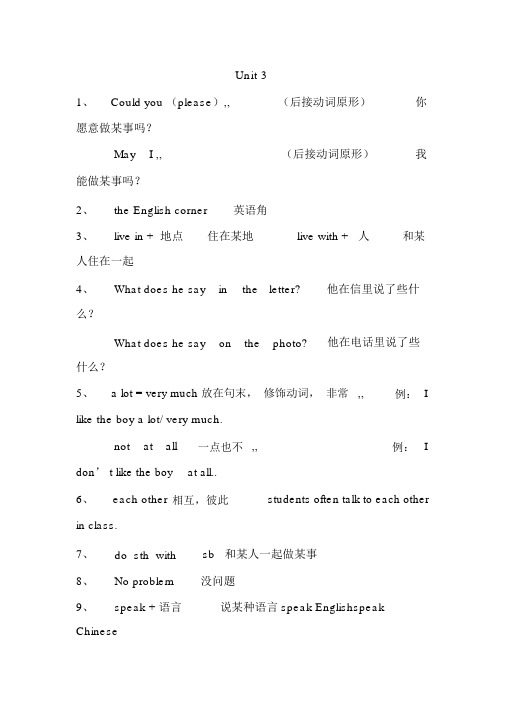
Unit 31、Could you (please),,(后接动词原形)你愿意做某事吗?May I ,,(后接动词原形)我能做某事吗?2、the English corner英语角3、live in + 地点住在某地live with + 人和某人住在一起4、What does he say in the letter?他在信里说了些什么?What does he say on the photo?他在电话里说了些什么?5、 a lot = very much 放在句末,修饰动词,非常,,例:I like the boy a lot/ very much.not at all一点也不,,例:I don’ t like the boy at all..6、each other相互,彼此students often talk to each other in class.7、do sth with sb 和某人一起做某事8、No problem没问题9、speak + 语言说某种语言speak Englishspeak Chinese10、the Great Wall 长城11、come/go to + 地点去某地但 home 、 here 、there这些是副词,前面不能加to例: go home / come here / go therego to do sth去做某事例:They go to play basketball.12、 like doing sth喜欢做某事like to do sth想要做某事13、It ’ s + adj +to sb 对某人来说是 ,,的14、help sb with sth =help sb (to) do sth帮助某人某事15、be at home = be in在家go home 回家 get home 到家in one’ s home在某人的家里16、have a seat / take a seat / sit down请坐下17、office worker办公室职员cook厨师cooker 炊具18、on a farm在农场上on the sofa在沙发上19、 a photo of one’ familys某人的全家照Family Tree家谱(首字母都大写 )20、in a hospital 在医院(纯属地点概念)in hospital 因病住院例:He is ill in hospital. 他生病住院He is in a hospital.他在医院里 (不一定是因为生病来到医院)21、look after sb =take care of sb照顾某人22/teach sb sth= teach sth to sb教某人某东西teach sb to do sth 教某人做某事21、help oneself(to sth. )请随便(吃 ,,)help yourself/ yourselves(to fish)22、I ’ d like sth=I would like sth.我想要 ,,24、Would like to do sth = want to do sth想要做某事25、Would you like something to eat (drink)?你想要一些吃(喝)的东西吗?to eat 或 to drink 修饰 something,作为后置定语。
Unit+3-Unit4语法知识精讲 仁爱版英语七年级上册

Some 和 any 意为 一些, 用于修饰可数和不可数名词
Some flags OR Any flags ?
Please read these sentences carefully
There are some flags in the picture .
some 用于肯定句
Are there any flags in the picture ? There aren't any flags in the picture.
用所给代词的适当形式填空:
• 1. Show __m_e__ how to draw a pig, OK? (I) • 2. Let’s play with __hi_m__. (he ) • 3. _T_h_e_y don’t know his name. Would you please
tell _th_e_m____? ( They ) • 4._S_h_e__( her) want to buy a book for _m_e_ (I)
Could you give me some stars ?
Sure!
some 还可用于表示 请求的一般疑问句中
用some 或 any 填空
1. I have __s_o_m__e_ books.
2. Do you have __a_n__y__ apples? 3. He doesn't have ___a_n_y___ money.
不可数名词
(1)不能用具体的数目来表示,前面不能加a/an,没有复数形式。 如:milk, chicken, bread, Coke, coffee, rice, juice, fish, tea, water, chocolate等。 (2)液体,肉类,金木水火土,米面茶肉布,油盐糖酒醋 (3)抽象名词 (4)不可数名词若要表示数量,可用:数词+量词+ of + 不可数名词。 如:a glass of milk 一杯牛奶;ten bottles of apple juice; ten loaves of bread 十条面包
仁爱版英语七年级上册知识点归纳总结(整理版)
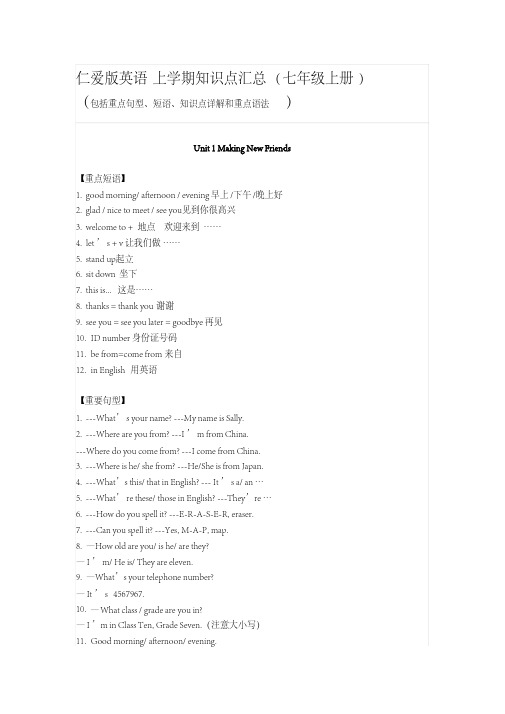
仁爱版英语 上学期知识点汇总 ( 七年级上册 )(包括重点句型、短语、知识点详解和重点语法 )Unit 1 Making New Friends【重点短语】1.good morning/ afternoon / evening 早上 /下午 /晚上好2.glad / nice to meet / see you 见到你很高兴3.welcome to + 地点 欢迎来到 ……4.let ’ s + v 让我们做 ……5.stand up 起立6.sit down 坐下7.this is... 这是……8.thanks = thank you 谢谢9.see you = see you later = goodbye 再见10.ID number 身份证号码11.be from=come from 来自12.in English 用英语【重要句型】1.---What’ s your name? ---My name is Sally.2.---Where are you from? ---I ’ m from China.---Where do you come from? ---I come from China.3.---Where is he/ she from? ---He/She is from Japan.4.---What’s this/ that in English? --- It ’ s a/ an …5.---What’ re these/ those in English? ---They’re …6.---How do you spell it? ---E-R-A-S-E-R, eraser.7.---Can you spell it? ---Yes, M-A-P, map.8.—How old are you/ is he/ are they?— I ’ m/ He is/ They are eleven.9.—What’s your telephone number?— It ’ s 4567967.10.— What class / grade are you in?— I ’m in Class Ten, Grade Seven.(注意大小写)11.Good morning/ afternoon/ evening.12.— Hello!/Hi! —Hello!/Hi!13.— Nice/Glad to see/meet you. — Nice/Glad to see/meet you, too.14.— Welcome to China/my home. —Thanks.15.— How do you do? —How do you do?16.— How are you? — Fine, thank you. And you? — I ’m OK.17.— See you then/ later. —See you.18.— Goodbye. —Bye.19.— Thank you. —You’rewelcome. / That ’ s OK./Not at all.【重点语法】1.元音字母: Aa Ee Ii Oo Uu包含有以下元音的字母:[e] Aa Hh Jj Kk[i:] Ee Bb Cc Dd Gg Pp Tt Vv[aI] Ii Yy[ju:] Uu Qq Ww[e] Ff Ll Mm Nn Ss Xx Zz2.大小写句首字母,人名,地名,称呼语,专有名词,星期的首字母要大写,引人注意。
(仁爱湘教版)中考考点解密:七年级(上)units-3—4-知识点梳理.doc

七年级(上)Units 3到4重难点精讲考点1辨析some与anysome可以代替名词和形容词,常用在肯定句中作主语、宾语、定语等。
作定语时,它可以修饰可数名词或不可数名词,通常表示不确定的含义。
如:Some are doctors. Some are nurses.有些人是医生,有些人是护士。
(作主语)some用于疑问句中,表示邀请或请求,或希望对方给予肯定的答复。
如:Would you like some bread?吃一些面包吧?(表示邀请)Can I have some water?我能喝点水吗?(希望得到肯定的答复)带有some的复合不定代词一般用于肯定句屮,带有any的复合不定代词一般用于否定句、疑问句和条件状语从句屮。
如:Someone suggests putting off the meeting.有人建议推迟会议。
Did you meet anyone on your way home?你冋家的路上碰到什么人了吗?注意:something和anything的区别与some和any的相同。
考点2 辨析problem 与questionproblem指被提出的疑难的、困难的、需要解决的问题,如:失业、人口等问题。
如:Don't worry, I will help you to solve the problem.别担心,我将会帮助你解决这个问题的。
question多指对不懂的事情提出的问题,往往期待他人给予答案;也可指需要考虑、讨论的问题,常与ask/answer连用。
如:Who can answer the question?谁能回答这个问题?考点3 辨析speak, say, tell 与talkspeak -般用来表示“说话”的能力,意为“说,讲;演说”。
speak to…表示“对……说”, 说某种语言也用speako如:lean' t speak Japanese, but I can speak a little English.我不会说日语,但会点英语。
仁爱版|七年级英语上册各单元重点短语 句型 语法全汇总
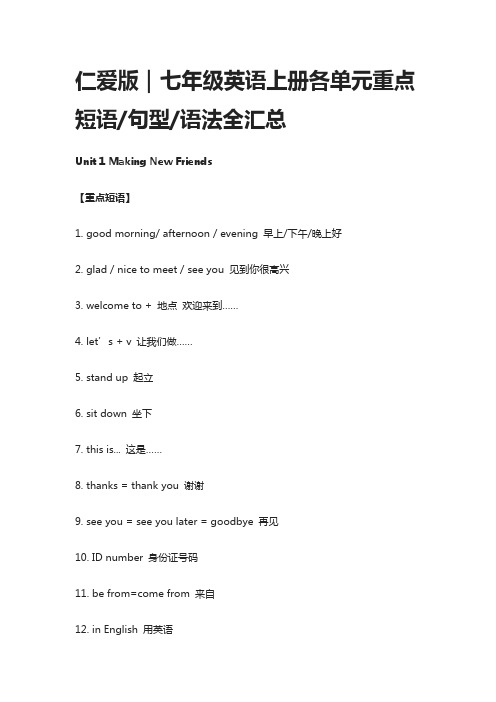
仁爱版|七年级英语上册各单元重点短语/句型/语法全汇总Unit 1 Making New Friends【重点短语】1. good morning/ afternoon / evening 早上/下午/晚上好2. glad / nice to meet / see you 见到你很高兴3. welcome to + 地点欢迎来到……4. let’s + v 让我们做……5. stand up 起立6. sit down 坐下7. this is... 这是……8. thanks = thank you 谢谢9. see you = see you later = goodbye 再见10. ID number 身份证号码11. be from=come from 来自12. in English 用英语【重要句型】1. ---What’s your name? ---My name is Sally.2. ---Where are you from? ---I’m from China.---Where do you come from? ---I come from China.3. ---Where is he/ she from? ---He/She is from Japan.4. ---What’s this/ that in English? --- It’s a/ an…5. ---What’re these/ those in English? ---They’re…6. ---How do you spell it? ---E-R-A-S-E-R, eraser.7. ---Can you spell it? ---Yes, M-A-P, map.8. —How old are you/ is he/ are they?—I’m/ He is/ They are eleven.9. —What’s your telephone number?—It’s 4567967.10. —What class/ grade are you in?—I’m in Class Ten, Grade Seven.(注意大小写)11. Good morning/ afternoon/ evening.12. —Hello!/Hi! —Hello!/Hi!13. —Nice/Glad to see/meet you. —Nice/Glad to see/meet you, too.14. —Welcome to China/my home. —Thanks.15. —How do you do? —How do you do?16. —How are you? —Fine, thank you. And you? —I’m OK.17. —See you then/ later. —See you.18. —Goodbye. —Bye.19. —Thank you. —You’re welcome./That’s OK./Not at all.【重点语法】1. 元音字母:Aa Ee Ii Oo Uu包含有以下元音的字母:[e] Aa Hh Jj Kk[i:] Ee Bb Cc Dd Gg Pp Tt Vv[aɪ] Ii Yy[ju:] Uu Qq Ww[e] Ff Ll Mm Nn Ss Xx Zz2. 大小写句首字母,人名,地名,称呼语,专有名词,星期的首字母要大写,引人注意。
仁爱七年级上册Unit3Unit4重要句型[整理].docx
![仁爱七年级上册Unit3Unit4重要句型[整理].docx](https://img.taocdn.com/s3/m/03084ef9af45b307e971973d.png)
UNIT 3 Getting Together\ Topic 11. - Could you please tell me your name?你能告诉我你的名字吗?••Sure. My name is Jane. Could you please+V 原 “你能 ........ 吗? ”2. —Could you help me with my Chinese? = Could you help me study Chinese? -No problem.\Sure.\OK. help sb with sth=help sb do sth "帮助某人做某事”3. ・—Can you speak English?—Do you come from the U.S.A?-No, I don ,1.1 come from Canada>5. —Do you like English? -Yes, I like it very much\ a lot\ a little. -No, 1 don ,t like it at all.6. -Does Lucy like China? -Yes, she doesA No, she doesnt7. -Does Kangkang like English? -Yes, He likes it very much\ a lot\ a little. —No, He doesift like it at alLa lot 二very much “很,非常”,a little (<一点点”,not...at all 根本不" 8. —Does he speak Chinese?■■ Yes, he doesA No, he doesntIL —Who is the letter from? 这封信是谁写的? -Ifs from my pen pal, Sam.12. -But he knows a lot about China >但他知道许多关于中国的事情.know …about 知道关于-Yes, I can>\No, I cant4・ 9・ 一Do they speak Chinese? —Yes, they doA No, they dont 10. —Where does he live? -He lives in England.13.-What does he say in the letter?他在信里说了什么?-He wants to visit Beijing.14.-Where does Lucy come from? ・・ She comes from England.15. help each other 互相帮助人称代词主格与宾格:主格I you he she it we you they 宾格me you him her it us you them否定句:Kangkang doesift like English.般疑问句:Do you want a pen pal? 一般疑问句:Does Kangkang like English?Topic2Glad to meet you. Glad to meet you, too.-What do you do?=What are you?你是做什么的?Pm a student.—Where do you study?你在哪里上学?I study in a school.-What does your mother do? = What is your mother? She is a teacher —Where does she work?她在哪里工作?She works in a schooL —What do your parents do?你父母是做什么的?“They are office workers<7. —Where do they work? & —What does the man do? —They work in an office -He is a doctor.否定句:I don9t want a pen pal.肯定回答:Yes, I do. 否定回答:No, I don,t 肯定回答:Yes, he does.否定回答:No, he doesn,t10.-What do the men do? 11・-Where do they work? They,re farmers・ -They work on a farm.12.show sth to sb=show sb sth 把某物给某人看13.a photo of "一张..... 的照片” a photo of my family14.・・Who,s the young woman in yellow? ・・She's my aunt.15・一Is the young woman in red your mother? -Right. Thafs my mother.16.-Is the young man in a green T-shirt your uncle?17.-Who are they on the sofa? —My grandparents, my cousin and I.1& -Who is the man in black? ・・He is Kangkang9s father.19. live with "和.... 同住”。
七年级Unit3-Unit4期末复习笔记仁爱版
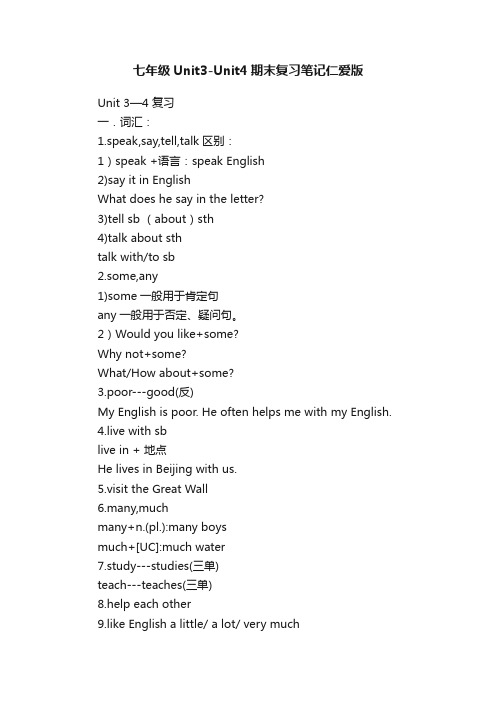
七年级Unit3-Unit4期末复习笔记仁爱版Unit 3—4 复习一.词汇:1.speak,say,tell,talk区别:1)speak +语言:speak English2)say it in EnglishWhat does he say in the letter?3)tell sb (about)sth4)talk about sthtalk with/to sb2.some,any1)some一般用于肯定句any一般用于否定、疑问句。
2)Would you like+some?Why not+some?What/How about+some?3.poor---good(反)My English is poor. He often helps me with my English.4.live with sblive in + 地点He lives in Beijing with us.5.visit the Great Wall6.many,muchmany+n.(pl.):many boysmuch+[UC]:much water7.study---studies(三单)teach---teaches(三单)8.help each other9.like English a little/ a lot/ very much10.don’t / doesn’t like … at all11.at / homego / home(home前面不加介词或冠词a/an/the)12.its,it’sits它的:its+n.it’s它是It’s a cat.Its name is Mimi.13.kid—kidding(现在分词)Are you kidding?14.shop—shopping(现在分词)go shopping= do some shopping15.sit---seat(n.)16.have a seat=sit down17.mother---father(对应词)aunt--uncle(对应词)grandmother-grandfather(对应词)sister--brother(对应词)nurse--doctor(对应词)daughter---son(对应词)18.work—worker(指人)drive—driverfarm---farmercook---cook19.Jim’s family tree20.family:1)“家庭”,谓语单数。
仁爱版英语七年级unit3知识点
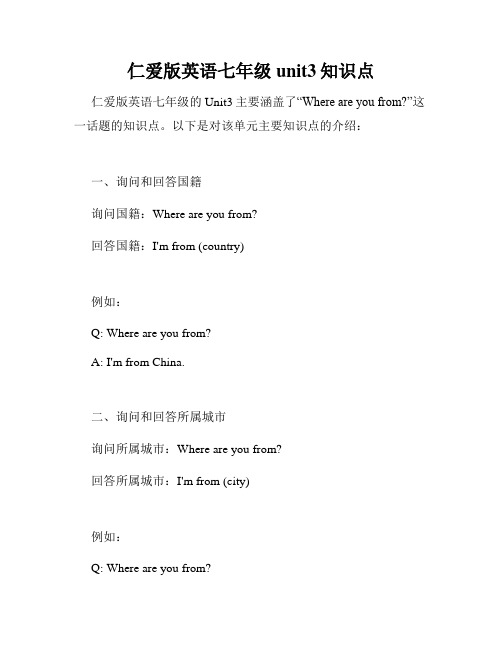
仁爱版英语七年级unit3知识点仁爱版英语七年级的Unit3主要涵盖了“Where are you from?”这一话题的知识点。
以下是对该单元主要知识点的介绍:一、询问和回答国籍询问国籍:Where are you from?回答国籍:I'm from (country)例如:Q: Where are you from?A: I'm from China.二、询问和回答所属城市询问所属城市:Where are you from?回答所属城市:I'm from (city)例如:Q: Where are you from?A: I'm from Beijing.三、询问和回答语言询问语言:Do you speak (language)?回答语言:Yes, I do. / No, I don't.例如:Q: Do you speak English?A: Yes, I do.四、介绍自己介绍自己:My name is (name). I'm from (country/city). I speak (language).例如:My name is Jane. I'm from New York. I speak English.五、形容词的比较级和最高级形容词的比较级用于比较两个人或物的特征,最高级用于比较三个或更多人或物的特征。
例如:Tina is taller than Tom. (比较级)Bob is the tallest boy in the class. (最高级)六、动词be的变化be的三种形式:am (I am)is (he/she/it/this/that is)are (you/we/they/these/those are)例如:I am from China.She is my sister.You are my friend.以上就是仁爱版英语七年级Unit3主要的知识点。
仁爱版英语七年级上册Unit3,4知识点
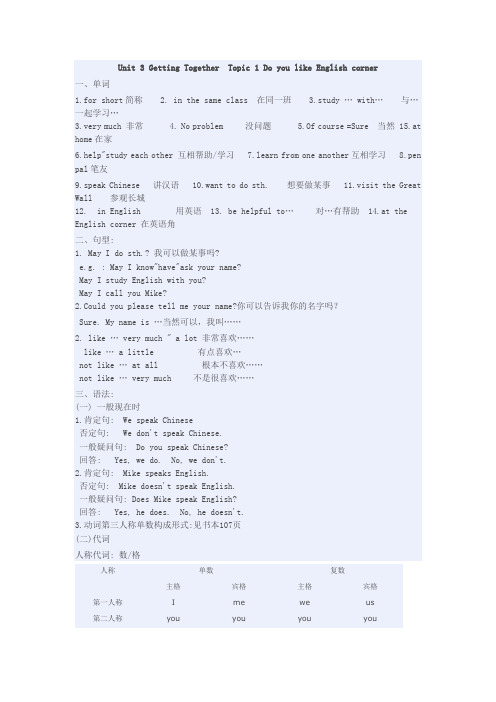
Unit 3 Getting Together Topic 1 Do you like English corner一、单词1.for short简称2. in the same class 在同一班3.study … with… 与…一起学习…3.very much 非常4. No problem 没问题5.Of course =Sure 当然 15.at home在家6.help"study each other 互相帮助/学习7.learn from one another互相学习8.pen pal笔友9.speak Chinese 讲汉语 10.want to do sth. 想要做某事 11.visit the Great Wall 参观长城12. in English 用英语13. be helpful to… 对…有帮助 14.at the English corner 在英语角二、句型:1. May I do sth.? 我可以做某事吗?e.g. : May I know"have"ask your name?May I study English with you?May I call you Mike?2.Could you please tell me your name?你可以告诉我你的名字吗?Sure. My name is …当然可以,我叫……2. like … very much " a lot 非常喜欢……like … a little 有点喜欢…not like … at al l 根本不喜欢……not like … very much 不是很喜欢……三、语法:(一) 一般现在时1.肯定句: We speak Chinese否定句: We don't speak Chinese.一般疑问句: Do you speak Chinese?回答: Yes, we do. No, we don't.2.肯定句: Mike speaks English.否定句: Mike doesn't speak English.一般疑问句: Does Mike speak English?回答: Yes, he does. No, he doesn't.3.动词第三人称单数构成形式:见书本107页(二)代词人称代词: 数/格人称单数复数主格宾格主格宾格第一人称I me we us第二人称you you you you第三人称hesheit himheritthey them主格:在句中当句子主语e.g. I have a good friend.He has a good friend.宾格: 在句中当动词的宾语或介词的宾语,形成动宾或介宾结构.Please call me Mike. (动宾)Give it (动宾) to me (介宾) .Help us find him. (动宾)人称代词排列顺序:(可记住口诀)you, he and I; we, you and they; he and she 口诀:对你尊重you在前,谦虚礼貌I最后;我们人多力量大,we要排在you之前,they委屈垫在后;两性并列不平等,绅士风度放一边,he 在前she在后。
仁爱版(2024新版)七年级英语上册Unit 4 知识清单(记忆版)
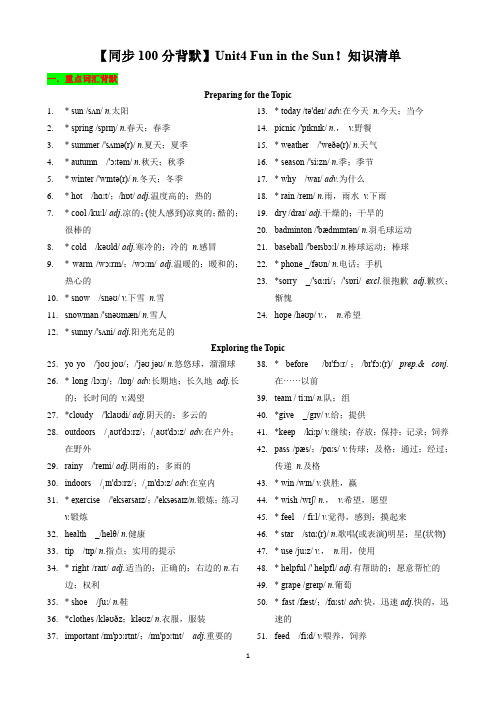
【同步100分背默】Unit4 Fun in the Sun!知识清单一.重点词汇背默Preparing for the Topic1.* sun /sʌn/ n.太阳2.* spring /sprɪŋ/ n.春天;春季3.* summer /'sʌmə(r)/ n.夏天;夏季4.* autumn /'ɔːtəm/ n.秋天;秋季5.* winter /'wɪntə(r)/ n.冬天;冬季6.* hot /hɑːt/;/hɒt/ adj.温度高的;热的7.* cool /kuːl/ adj.凉的;(使人感到)凉爽的;酷的;很棒的8.* cold /kəʊld/ adj.寒冷的;冷的n.感冒9.* warm /wɔːrm/;/wɔːm/ adj.温暖的;暖和的;热心的10.* snow /snəʊ/ v.下雪n.雪11.snowman /'snəʊmæn/ n.雪人12.* sunny /'sʌni/ adj.阳光充足的13.* today /tə'deɪ/ adv.在今天n.今天;当今14.picnic /'pɪknɪk/ n.,v.野餐15.* weather /'weðə(r)/ n.天气16.* season /'siːzn/ n.季;季节17.* why /waɪ/ adv.为什么18.* rain /reɪn/ n.雨,雨水v.下雨19.dry /draɪ/ adj.干燥的;干旱的20.badminton /'bædmɪntən/ n.羽毛球运动21.baseball /'beɪsbɔːl/ n.棒球运动;棒球22.* phone _/fəʊn/ n.电话;手机23.*sorry _/'sɑːri/;/'sɒri/ excl.很抱歉adj.歉疚;惭愧24.hope /həʊp/ v.,n.希望Exploring the Topic25.yo-yo /'joʊ joʊ/;/'jəʊ jəʊ/ n.悠悠球,溜溜球26.* long /lɔːŋ/;/lɒŋ/ adv.长期地;长久地adj.长的;长时间的v.渴望27.*cloudy /'klaʊdi/ adj.阴天的;多云的28.outdoors /ˌaʊt'dɔːrz/;/ˌaʊt'dɔːz/ adv.在户外;在野外29.rainy /'reɪni/ adj.阴雨的;多雨的30.indoors /ˌɪn'dɔːrz/;/ˌɪn'dɔːz/ adv.在室内31.* exercise /'eksərsaɪz/;/'eksəsaɪz/n.锻炼;练习v.锻炼32.health _/helθ/ n.健康33.tip /tɪp/ n.指点;实用的提示34.* right /raɪt/ adj.适当的;正确的;右边的n.右边;权利35.* shoe /ʃuː/ n.鞋36.*clothes /kləʊðz;kləʊz/ n.衣服,服装37.important /ɪm'pɔːrtnt/;/ɪm'pɔːtnt/ adj.重要的38.* before /bɪ'fɔːr/;/bɪ'fɔː(r)/ prep.&conj.在······以前39.team / ti:m/ n.队;组40.*give _/gɪv/ v.给;提供41.*keep /kiːp/ v.继续;存放;保持;记录;饲养42.pass /pæs/;/pɑːs/ v.传球;及格;通过;经过;传递n.及格43.* win /wɪn/ v.获胜,赢44.* wish /wɪʃ/ n.,v.希望,愿望45.* feel / fi:l/ v.觉得,感到;摸起来46.* star /stɑː(r)/ n.歌唱(或表演)明星;星(状物)47.* use /juːz/ v.,n.用,使用48.* helpful /' helpfl/ adj.有帮助的;愿意帮忙的49.* grape /greɪp/ n.葡萄50.* fast /fæst/;/fɑːst/ adv.快,迅速adj.快的,迅速的51.feed /fiːd/ v.喂养,饲养52.* bird /bɜːrd/;/bɜːd/ n.鸟;禽53.* red / red/ n.红色adj.红色的54.* lake /leɪk/ n.湖;湖泊Developing the Topic55.Tai Chi /ˌtaɪ tʃiː/ n.太极56.* when / wen/ adv.,conj.什么时候;当……时57.ski /'skiː/ v.滑雪(运动)58.* hometown /'həʊmtaʊn/ n.家乡,故乡59.* travel /'trævl/ v.,n.旅行;游历60.mountain /'maʊntn/;/'maʊntən/ n.高山;山岳61.* turn /tɜːrn/;/tɜːn/ n.,v.转弯62.*move /muːv/ v.移动;搬(家)Wrapping up the Topic63.survey /'sɜːrveɪ/;/'sɜːveɪ/ n.,v.(做)民意调查64.* week _/wiːk/ n.周,星期65.* hour /'aʊə(r)/ n.小时66.result /rɪzʌlt/ n.结果;后果;成绩67.* cap /kæp/ n.便帽,制服帽68.* pair / per/;/peə(r)/ n.一双;一对;俩69.* shorts /ʃɔːrts/;/ʃɔːts/ n.短裤70.* zoo /zuː/ n.动物园71.race /reɪs/ n.赛跑;速度;竞赛;竞争72.* leg / leg/ n.腿73.*last /læst/;/lɑːst/ v.持续det.最后的;最近的adv.最终74.* write /raɪt/ v.书写;写作;写信75.* down /daʊn/ prep.向下;沿着adv.向下二.重点短语背默1.take sb to 带某人去2.go hiking远足3.make a snowman堆雪人4.have a picnic去野餐5.on the phone在电话上6.put on穿,表演7.be good at擅长8.why not为什么不9.ask sb to do叫某人做…10.all year long整年11.is good for对...有益12.warm up热身13.too much 太多14.play football踢足球15.after class下课后16.have fun玩得高兴17.give up放弃18.keep doing sth继续做某事19.in the end最后20.take photos 照像21.do sports 做运动22.walk the dog 遛狗23.feed a bird 喂鸟24.make turn转弯25.learn a lot from从...学到了很多26.at home在家27.take a walk散步28.in different seasons在不同的季节29.join in 参加30.take part in 参与三.重点句子背默1.My parents usually take us to go hiking on weekends.我的父母通常在周末带我们去徒步旅行。
- 1、下载文档前请自行甄别文档内容的完整性,平台不提供额外的编辑、内容补充、找答案等附加服务。
- 2、"仅部分预览"的文档,不可在线预览部分如存在完整性等问题,可反馈申请退款(可完整预览的文档不适用该条件!)。
- 3、如文档侵犯您的权益,请联系客服反馈,我们会尽快为您处理(人工客服工作时间:9:00-18:30)。
七年级上unit 3-4 知识点整合Unit3Topic1重点短语及句型:1.Could you please + 动词原形…?肯定回答:Sure/Of course./No problem.否定回答:Sorry.2. tell sb. sth. =tell sth. to sb.I tell my name to him.I tell him my name.3.a pen pal= a pen friend4. speak some Chinese5. help sb. with sth.=heip sb. to do sth.6. want to do sth. / want sth. / want sb. to do sth7.live in +地点住在某地live with + sb. 和某人住在一起8 each other We love each other very much.9. not … at allI don’t like English at all.习题巩固:根据句意及首字母完成下列句子1.I have a pen p__. He helps me with my English.2.Tom and I are s__in a high school.3. I want to v__my English teacher.4.My English is p__so I can’t tell you anything.单选:1.I like the little cat a lot but she likes it __.A. a lotB. at allC. a littleD. very much2. We often help __.A. herB. sheC. heD. my3. Do they __English a lot?A. sayB. talkC. speakD.tell4. He to visit China.A. wantB. to wantC. wantsD. don’t want5. ---- Could you give me an apple?----__. I have three.A. Sorry.B. Thank youC. No problemD. Please句型转换:1.我想在英语方面帮助他I __to help him__his English.2. Kate likes the food. 用not… at all 改写Kate__like the food ____.3. I often help him and he often helps me. 合为一句He and I often help ____.4. She lives in the U.S.A. 对划线部分提问____she live?Topic 2重点短语及句型:1. be home/at home/go home/get home2. Glad to meet you.3. have a seat4. What do/ does sb.do? =What is sb.?=What’s one’s job?Sb + be + 职业6. in a hospital / in hospitalHe works in a hospital.He is ill in hospital.on a farm/ in a school / in an office/ in a factory / in a shop/ in a restaurant/ at homeAt, in 两个介词接地点时的区别At 常表示的位置是某一个具体的地点,一般用来指比较小的地方,如车站,村庄,建筑物,城镇等At school gate/ at the stationIn一般指大地方,如大城市,省,行政区,国家等如In shangha/ in the USA7. family 作为整体概念在句中作主语时,谓语动词用单数形式。
当family 作家庭成员讲时,为复数概念,如果在句中作主语时,谓语动词用复数形式。
My family is a big family.My family are on a visit to HK.8.teach sb sth. / teach sb. to do sth.9.play with sb./ sthDon’t play with the fire.习题巩固:单选1. Linda works in office.A. aB. anC. /D. big2. -----What your aunt do?----- She’s a farmer.A. doB. doesC. isD. are3. ----- What’s this?----- It’s a photo Bill’s family.A. ofB. toC. inD. on4. Their parents them at homeA. look atB. look afterC. look forD. look like5. ----What’s your father?-----A.He is forty.B. He is a cook.C. He is from Beijing.D. He is fine.Topic 3重点短语及句型:1.help yourself/yourselveshelp oneself to + n.Help youself to some apples.2.would like sth.= want sth.would like to do sth.= want to do sth.Would you like…?Yes, please/ Yes, thank you.No, Thanks. /No, thank you.What would you like to have/drink?3.What/how about…?What about some rice?How about going shopping?4.have…for breakfast/lunch/supperhave big/ light lunch5.May I take your order? / may I help you? / what can I do for you? Some chicken and vegetables, please.6.why not + do?= w hy don’t you do ?7.eat out8.be kind to = be friendly to sb.9.I’m glad to be here.习题巩固:用所给词的正确形式填空。
1. I’d like some __(milk).2. She would like __(fish).3. What about__(go) shopping with me?4. Would you like some__(vegetable)?5. I’d like to have something __(drink).6. Why not__(study) English with me?句型转换:1. Lin Tao would like some cakes.()____Lin Tao like?2. ---Would you like some milk?--- __,__.--- __,__.3. 你愿意和我们一起吃饭吗?Would you like to ________?4. What about some more vegetables?Why ____some more vegetables?__about having some more vegetables?5. 请给我点牛奶。
给你。
---Some milk __me, please.--- __you areUnit 4Topic 1Section A语法知识:1.buy sth. for sb.=buy sb. sth.E.g. She wants to buy some flowers for me.She wants to buy me some flowers.2.try on(如宾语是代词,放中间;如是名词放on后面)E.g. The shoes are nice. Please try them on.Maria tries on the clothes .3. how much is/are …?E.g. How much are the shoes? → They’re 165 yuan.4. Sth . look nice on sbE.g. This dress looks nice on you5.表示数目的词称为基数词。
其形式如下:A.从1——10one,two,three,four,five,six,seven,eight,nine,ten.B.从11——19eleven,twelve,thirteen,fourteen,fifteen,sixteen,seventeen,eighteen,nineteen.这里除eleven,twelve,thirteen,fifteen,eighteen为特殊形式外,fourteen,sixteen,seventeen,nineteen 都是由其个位数形式后添加后缀-teen构成。
C.从21——99整数几十中除twenty,thirty, forty,fifty,eighty为特殊形式外,sixty,seventy,ninety 都是其个位数形式后添加后缀-ty构成。
表示几十几时,在几十和个位基数词形式之间添加连字符“-”21 → 76 →D.百位数个数基数词形式加“hundred”,表示几百,在几十几与百位间加上and.101 →320 →648 →注意:hundred后不能加S,单数数字后面也不能加S。
three hundreds (×) three hundred(√)forty-eights(×) forty-eight (√)Section B二、语法知识:1. think 想,认为think about 考虑think of 想法,认为E.g Kangkang thinks it’s Li Ming’s.I’ll think about it.Will you think of me after I leave?○3 What do you think of …?=How do you like …?What do you think of this yellow skirt?○4 Thank you all the same.=Thanks all the same.○5 kid作名词是“小孩”的意思,作动词是“开玩笑”的意思E.g Are you kidding?Section C○1 几种量词表示方法:kilo two kilos of apples .bag a bag of rice. a bag of salt three bags of riceloaf a loaf of bread . two loafs of bread .bar a bar of chocolate . two bars of chocolate .bottle a bottle of milk two bottles of milktin a tin of Coke . two tins of Coke .pair a pair of shoes/pants/glove;glass a glass of water . three glasses of watercup four cups of tea.○3much和many1.询问数量how much +不可数名词+ …?how many+可数名词(复数) +…?We need two kilos of apples. →How many apples do you need?We need five bags of rice. →How much rice do you need?○4 some与any 的用法some 用于肯定句及语气委婉的疑问句,any用于否定句和疑问句中。
